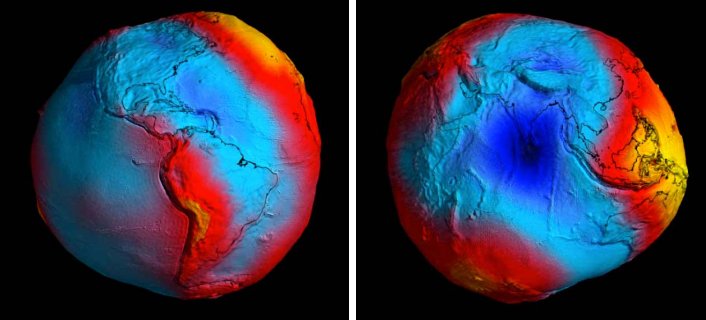Earth’s Equatorial Circumference Is Greater Than Its Polar Circumference
: Is the Earth a perfect sphere?
Answer: The Earth is not a perfect sphere.
Scientists have unveiled the most accurate map ever produced of the Earth’s gravity. The map is called a geoid, the result of two years of orbital surveys by the European Space Agency (ESA) Gravity Field and Steady-State Ocean Circulation Explorer (GOCE) satellite that also studies ocean circulation and the movement of ice.
The geoid is a map of the Earth’s gravitational field and since gravity impacts things like sea level and currents, it’s important to understand how it varies.
This information is particularly important to understanding sea level rise. Scientists predict that, on average, sea level will rise 3 feet overall by 2100, but those three feet will be distributed differently throughout the world.

As you can see, the map shows the Earth is not shaped not like a sphere but a potato.
The reason why our planet has this weird shape is because the Earth’s gravity isn’t uniform. Our planet is affected everyday by such factors like winds, currents and tides, so because gravity is higher in Iceland than for example in India.
A precise model of Earth’s geoid is crucial for deriving accurate measurements of ocean circulation, sea-level change and terrestrial ice dynamics.
The mean radius of Earth is 3,959 miles (6,371 kilometers). The planet’s rotation causes it to bulge at the equator. Earth’s equatorial diameter is 7,926 miles (12,756 kilometers), but from pole to pole, the diameter is 7,900 miles (12,720 km) — a difference of only 40 miles (64 km).
The circumference of Earth at the equator is about 24,902 miles (40,075 km), but from pole-to-pole — the meridional circumference — Earth is only 24,860 miles (40,008 km) around. This shape, caused by the flattening at the poles, is called an oblate spheroid.
This means that the Earth’s equatorial circumference is greater than its polar circumference.



 Creators of mankind
Creators of mankind Description of “Tall white aliens”
Description of “Tall white aliens” Where they came from?
Where they came from? About hostile civilizations
About hostile civilizations The war for the Earth
The war for the Earth “Tall white aliens” about eternal life
“Tall white aliens” about eternal life Video: “Nordic aliens”
Video: “Nordic aliens” Aliens
Aliens Alien encounters
Alien encounters The aliens base
The aliens base UFO
UFO Technology UFO
Technology UFO Underground civilization
Underground civilization Ancient alien artifacts
Ancient alien artifacts Military and UFO
Military and UFO Mysteries and hypotheses
Mysteries and hypotheses Scientific facts
Scientific facts


















